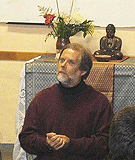Lecture:
EcoDharma: Buddhist Teachings on the Precipice
In this video teaching, David Loy draws on his recent book EcoDharma: Buddhist Teachings for the Ecological Crisis to offer a Buddhist perspective on responding to the climate emergency that can help us face issues of social and political divide and upheaval as well. All of these daunting challenges call for bodhisattvas, or ecosattvas, who have a “two-sided practice”—committed to inner transformation and thus able to maintain equanimity in the face of uncertainty, while also ready to engage in compassionate social action.
Please visit One Earth Sangha to view this lecture
Lecture:
Healing Ecology: A Buddhist Perspective on the Eco-crisis
Does Buddhism offer any special perspective on the ecological crisis? Do its teachings imply a different way of understanding the biosphere, and our relationship to it, which can really help us at this critical time in history when we are doing so much to destroy it?
There are reasons to doubt it: after all, Śākyamuni Buddha lived in a very different time and place, Iron Age India. But the Buddha did know about dukkha, the term usually translated as “suffering” yet to be understood in the broadest sense: dissatisfaction, discontent, anxiety—basically, our manifest inability to be happy, which does not mean that life is always miserable but that even those who are wealthy and healthy experience a disease that keeps gnawing. That we find life frustrating, one damn problem after another, is not accidental, because it is the nature of an unawakened mind to be bothered about something.
What, if anything, does that imply about the ecological crisis? There are precise and profound parallels between our usual individual predicament, according to Buddhism, and the present situation of human civilization. This suggests that the eco-crisis is as much a spiritual challenge as a technological and economic one. Does this mean that there is also a parallel between the two solutions? Does the Buddhist response to our personal predicament also point the way to resolving our collective one? ...
